Photo by Ryan Hunter
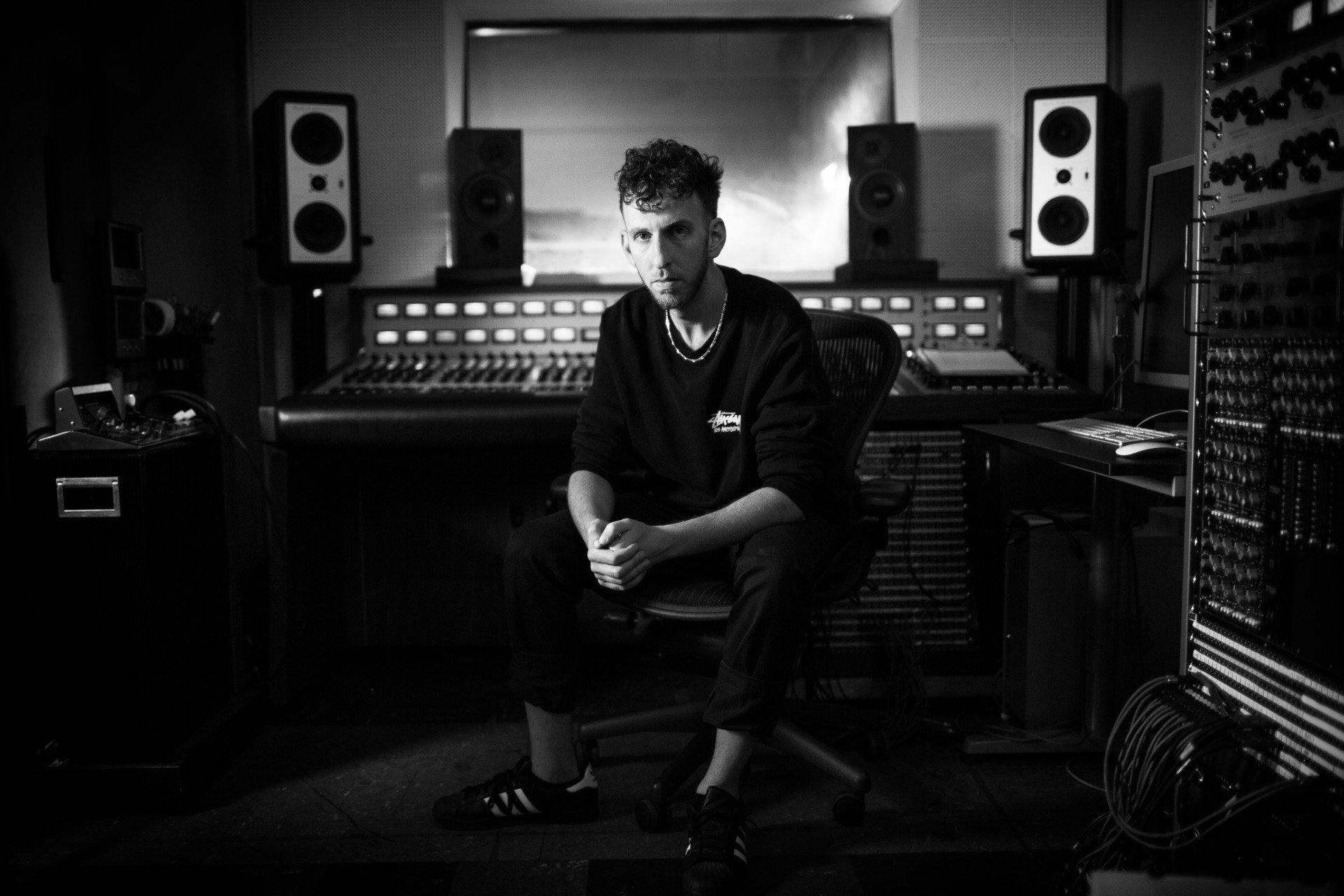
Ariel Rechtshaid
news
More Than A Decade In, Songwriter & Producer Ariel Rechtshaid Stays Winning
With another HAIM album under his belt and a Hot 100 hit from a member of his Heavy Duty Music roster, the Los Angeles-based hitmaker is having yet another banner year in a string of banner years
In late June, Ariel Rechtshaid scored a Hot 100 Number One in the unlikeliest of ways, he says. "It was another random phenomenon in a series of random phenomena that I've witnessed in my life—and another thing you couldn't possibly control or cook up."
The 41-year-old songwriter and producer is talking about "Trollz," a splashy chart-topping collaboration by New York meme-turned-rapper 6ix9ine and actual New York legend Nicki Minaj, which was co-written and produced by Jeremiah Raisen, who’s signed to Rechtshaid’s Heavy Duty Music. While it’s not a direct Hot 100 credit to Rechtshaid himself, it’s one in a string of massive successes the company has racked up this year. In 2020 alone, acts like HAIM, Charli XCX, Bon Iver, Yves Tumor, and Francis & the Lights have enlisted Heavy Duty Music’s stacked roster to assist on their recent projects. "When you're able to take a step back and forget about all the bullshit, when you see the impact that you've made on people's lives, that's really the thing you're most proud of," he says.
And that’s not even taking into account Rechtshaid’s own massive accomplishments over the last decade. Long considered one of the most thoughtful voices in pop music, he’s likely contributed to at least one of your favorite artist’s projects, helming hits for Madonna, Sky Ferreira, Carly Rae Jepsen, Blood Orange, U2, Vampire Weekend, The Chicks, HAIM, Adele, Beyoncé and more (many, many more).
Rechtshaid, a GRAMMY winner (for Usher's "Climax" and Vampire Weekend’s Father Of The Bride), carved an hour of his afternoon in early August to walk GRAMMY.com through his massive 2020, his equally staggering career and the ways in which he’s been able to get business back to usual after the pandemic hit Los Angeles earlier this year.
This interview has been edited and condensed for clarity.
You're someone who likes to get in the studio with artists for full projects. So how has this pandemic changed the way that you work?
It made me feel like I'm between jobs. I haven't had that in a long time. Everything's been one thing after another. I've taken breaks, but I've never been at home in my studio during that break.
My version of working in this world is not [stacking up sessions with] loads of different people every day. It's just not the groove I landed in. So once we were able to have access to testing, which we're fortunate to have in L.A.—and if it's somebody you know well enough that you feel like you can trust them, and there's transparency—then I was able to start getting back in the studio and do things the same way I'd ever done it. There’s fewer people hanging around, though, and it’s a little bit more focused.
At least a couple of the pandemic months have been occupied by surprise live recordings for artists that I have been working with. I did some work with The Killers on their new album. I did obviously a lot of work with HAIM on their last record. That's been the version of touring or promoting.
<style>.embed-container { position: relative; padding-bottom: 56.25%; height: 0; overflow: hidden; max-width: 100%; } .embed-container iframe, .embed-container object, .embed-container embed { position: absolute; top: 0; left: 0; width: 100%; height: 100%; }</style><div class='embed-container'><iframe src='https://www.youtube.com/embed/-wts5viH28E' frameborder='0' allowfullscreen></iframe></div>
Why do you prefer working with fewer artists on longer projects?
I came into it from more of a conceptual, full album state of mind. At first, there wasn't even really an option beyond that. Nobody I knew was even thinking about the idea of working with multiple producers or multiple co-writers. I don't think anyone would be able to afford that. It wasn't an option.
On top of that, the most influential music on me was always made that way too, whether it was hip-hop and a producer like J-Swift doing the whole Pharcyde record, or Dr. Dre doing full records too. Of course there's room for external people coming in to collaborate, but there's an overarching concept you're trying to achieve. It doesn't work by randomly working with different people and making a compilation album. That works for certain records, but it wasn't the kind of records that I think I’m at my peak working on.
For a full album, it's very easy to lose perspective and not really achieve what you necessarily wanted to or could have with a little bit more time and space, but there is control because it's lots of trial and error. So many songs change several times over the course of making an album. Sometimes the concept is found on the journey to making that album.
How do you choose how to divide your time in terms of who gets your attention in any given year?
A lot of it has to do with timing. If I commit to something, I'm in it. Unfortunately, [that means] I'm not available for other things and that's been weird and heartbreaking for me. At the same time, I've never really felt like I needed to work on everything that I like, or that I needed to work on everything, period. I'm so happy to be a fan of music and just listen to an album and not have gone through the hard work, and sometimes traumatizing work, of making that album. It's not a sport for me.
I want to work on things that I understand and I feel passionate about. Sometimes that's just not what people are looking for. When you talk about records where I've done a song or two, it's usually because they were just already making an album that way. Then they came to me and I felt either adventurous that day or I had an idea and there was some sort of reason or chemistry for doing it. Sometimes you want to try something you’ve never tried before. [That’s true of] Usher. I was a big fan, but I never really saw myself making that kind of music in the room with him, but I got asked. I was like, "I’ve got to give it a shot." I was really happy with it. "Climax" is a song that I'm very proud of being a big part of.
<style>.embed-container { position: relative; padding-bottom: 56.25%; height: 0; overflow: hidden; max-width: 100%; } .embed-container iframe, .embed-container object, .embed-container embed { position: absolute; top: 0; left: 0; width: 100%; height: 100%; }</style><div class='embed-container'><iframe src='https://www.youtube.com/embed/nNTyfVh3nmU' frameborder='0' allowfullscreen></iframe></div>
I mean, of all the songs to have taken a swing on, you walked away with a GRAMMY-winning cultural reset of a track.
Having been there, I attribute it to nothing less than just chemistry and luck and timing and the mood of everything, because it just happened. We didn't go in there with preconceived ideas. In fact, if I had any, they were incorrect. They were false. They [were just me being like], "Okay, I know what Usher sounds like," to hype myself up.
He really was instrumental in shutting the door on anything you could have expected from him. He was all about functioning on pure intuition, like, "Let's just roll, no ideas." He knew certain things [about what he wanted]: "I don't want it to be a four-on-the-floor track. I want to do something unexpected with you. That's why you're here." I was like, "Okay, oh shit."
It was a very different kind of experience than producing the Vampire Weekend album or the HAIM record. It's almost a completely different job. It's funny that you could be called a producer in both instances; it's such a vague term, in a way.
And yet you do take those single-song swings every now and then, and they seem to pay off. You just did it with The Chicks, who spoke so highly to me of you recently, on Gaslighter.
I had huge respect for the Chicks. Timing-wise, I was available, they were local, it was easy to accommodate the session. We just showed up and we talked. They probably told me a lot of what they told you. It's funny because the demo [of "For Her"] is very banging. Every reference they had was hard-hitting. We started to freestyle around the room and then me and Natalie [Maines] stayed there until midnight, putting together the framework of the song—a little bit of banjo and a little bit of fiddle, just to give it their identity. Then I handed over the stems to them and it was a year later and suddenly, I got asked for approval and I heard a very different version, which is interesting.
On the record, it was a very mellow, long, epic version. Ours was this three-minute, hard-hitting little gospel jam; it reminded me of Tom Petty, hip-hop, and gospel mashed up together. It goes to show how different each process can be.
Do you ever feel weird about leaving your work in someone else’s hands, not knowing what it’ll end up sounding like, if it ever even comes out?
It's so fun for me, really, because it's so interesting and so opposite of what I'm doing 364 days a year. By all means, I do love that. I don't feel like I'm a control freak. I feel like I have a point of view and I feel responsible when I'm hired to do something that that's what they're asking for. I'm here to give it. I'm also very interested in what the people I'm working with have to say and have to offer.
I feel like that's been really instrumental with HAIM and Vampire Weekend, where I give something, they give me something back, and we just keep going tit for tat. The result is far more elevated than either one of us could do on our own. We're pulling each other in different directions and it's fun. It's like a great game of basketball.
Where in the end, both teams win.
That's the idea—or both teams are at least better.
Let’s talk more about that HAIM record. What keeps you coming back to that creative well, three albums in?
They originally reached out to me because they saw my name on the credits of some of their favorite Cass McCombs songs. They also loved "Climax." They were like, "What?" Even though when I first heard them, I was like, "Woah, why me?" I think it was about exploration. They assumed that I was down for all of it and they were right. They were right that my influences and my interest is vast.
What people expected of them, at least for their first record, was based on their live shows—very straightforward rock. They just didn't have the means to expand on that yet when I met them. When I got to know them, they told me their influences ranged anywhere from the Eagles to Pharrell to Chaka Khan. They had a deep, deep, deep musical knowledge, and years and years of playing and studying and rhythmic abilities. It was this huge open canvas.
What's been really gratifying about working with them over the course of three albums is that things were moving so fast for them from the moment I met them. They were already touring and it just kept growing and growing; there was always a finite amount of time for work. That's okay. There wasn't not enough time, but you just hope that the next time, you can expand and go in a different direction and keep evolving. I had seen a glimpse of everything that everyone else has seen now, from "Forever" to "Summer Girl." I'd seen a snapshot of all of that on day one. The fact that we're talking about less than 40 songs or whatever it is? That's nothing. I feel like we could easily get to another three albums and still be exploring new territories.
<style>.embed-container { position: relative; padding-bottom: 56.25%; height: 0; overflow: hidden; max-width: 100%; } .embed-container iframe, .embed-container object, .embed-container embed { position: absolute; top: 0; left: 0; width: 100%; height: 100%; }</style><div class='embed-container'><iframe src='https://www.youtube.com/embed/ZjuA_o6Jzyo' frameborder='0' allowfullscreen></iframe></div>
You worked with Vampire Weekend on Modern Vampires Of The City, and you returned on Father Of The Bride. Is that another instance of you feeling like that’s a band with more to show the world with each album?
Why it worked out with us on Modern Vampires is because, without even having to think about it, I would never have any interest in trying to copy what they’d already done. I'm like, "Okay, let's explore," and that's exactly what they wanted too. They felt like they had already closed the chapter with the first record and Contra, and they wanted to break out of it.
We didn't make a conscious decision to go in and start working on the third record. They were fooling around. I think the process between production and writing is blurred when it's done in house. They’d started a lot of things, but had hit some sort of a wall. I had started to work on Rostam [Batmanglij]’s solo album after Contra came out. Then, at some point, just out of the blue, he was in town with Ezra. He called and asked if my studio was available, and would I be interested in coming and helping a little bit?
Without really knowing it, by the end of that first week, they had knocked down some barriers that they had felt. Then, we just kept going. Father of the Bride was very premeditated and also an experiment. I don't know that it was 100% clear that there would be a fourth album. People talk about how long that album took. It didn't really take that long. There was just a lot of time in between.
Without saying too much, again, it feels like the beginning of a new era. They had albums one, two and three, and then… I don't know. Now I feel like the process continues with potentially four, five, and six.
Am I to understand you’ve also been working with Sky Ferreira again?
Oh yeah.
This should come as no surprise to you, but fans are beyond eager for new Sky Ferreira music. We've been wondering where it is.
On some level, we never stopped. There was so much that was birthed out of that era of us working together. I can't exactly tell you what's going on internally over there, but I've wondered the same thing. I was always just on the tip of, "When you're ready, hit me up." When I met her, she was very young and she'd had a couple not great experiences trying to make music, trying to get what was inside of her out. I don't know that she had even fully formed a clear picture of what it was she was trying to get out of her.
The chemistry between us was good and we went on an exploration period. Out of that came, "Everything Is Embarrassing" and a couple early singles which clarified the direction of the album. We made that album, [Night Time, My Time], pretty quickly. Honestly, they were demos. After she had some time to sit with it, she realized that these "demos" were what she wanted, so it just came out like that.
I'm honored to be asked to be part of the next chapter. When Sky put out "Downhill Lullaby," I was super happy for her because I know what a struggle it was on the first record, and those previous singles, to find that sound. I know how much she had to fight against. There was an energy behind her but she just was never happy with the music. She was fighting the machine, in terms of like, "Oh, just sing this song this pop writer has written," you know what I mean?
<style>.embed-container { position: relative; padding-bottom: 56.25%; height: 0; overflow: hidden; max-width: 100%; } .embed-container iframe, .embed-container object, .embed-container embed { position: absolute; top: 0; left: 0; width: 100%; height: 100%; }</style><div class='embed-container'><iframe src='https://www.youtube.com/embed/rEamE0MYPkg' frameborder='0' allowfullscreen></iframe></div>
Someone wanted her to be one type of artist, which isn't what she wanted for herself.
From my perspective, it's not such an evil idea. It's just...they believe in her as a personality, and they want to help her put music out. They can't make the music for her, so they can only help her by suggesting this or that. What she and I did together is not something that you can really plan… it was a bit abnormal. We just played around and found something that I thought was very unique and represented her, and she felt the same way.
It was honestly another chance meeting, but for her to feel empowered enough to go do something else and figure it out is really exciting. I also felt that way with Solange. We had done a lot of work together early on. We stayed close and she played me A Seat At The Table, and I was like, "Oh, my God, I'm so happy for you," because I could sense that that was something that she was trying to make early on. She played me songs that she'd done all by herself. She took her time and she found it. It's nothing that I could have done with her. That was her. I was excited for Sky on that level as well. I'm also happy to be called back in for this next chapter, and we have some stuff cooking. It's cool. It's exciting.
The work you did with Sky, and then later with Carly Rae Jepsen, really changed the ways people thought about quote-unquote "pop" music in the 2010s. Suddenly, the most uncool genre was cool again.
I've felt that, but you really only realize it in retrospect. When artists call you to work on their project, you start to wonder, "What are you looking for that we're doing over here in our other world?" Because when I was working with Dev Hynes on Blood Orange, and Sky on Night Time, My Time, and even HAIM on Days Are Gone, it really felt like the periphery of the mainstream. With HAIM, we felt high praise by artists like Taylor Swift. A lot of artists were really inspired by that first HAIM album, and Sky’s too, but you're just doing your thing. The fact that it made a little dent in pop music? It's crazy.
It just kept me honest, really. I worked very hard for those successes, but I feel fortunate to have the encouragement to just do my thing, to not be competing with other trends or producers, to not do something that is not authentically me. In those earlier days, everything felt like little stepping stones of encouragement and confidence, and achieving a slightly higher plane with every artist and every project.
With Carly, it wasn't like any of those songs were as big as "Call Me Maybe," but it seemed like her goal was to make something that felt more authentic to her—or at least authentic to her then-self. It achieved what it was trying to achieve, and introduced her to a new audience. All those things feel good. A lot of times, people just run through a Rolodex of producers who are just getting it done in this era, and that could be me. Really, what they're hoping for is more of the same, and for me to have success with doing this thing that we cooked up in the comfort of our own anonymous little home was a really fortunate thing for me because it encouraged me to just continue to explore and do my thing and be me.
We’ve talked about building up newer artists. But how do you go into a room with someone like Madonna and not lose yourself in those sessions?
I'm fairly sure I lost myself that time.
Are you?
I mean, not in a bad way. I came into that session with Diplo, who I had a longstanding creative relationship with, which I'm also extremely fortunate for. When we first started working together, it could not be more bizarre [of a pairing]. That first Major Lazer record and some of the stuff we were doing early on was so left field, and the fact that he became such a go-to pop producer was so wild to me. That got us in the room with people like Madonna, but nobody was steering that ship other than Madonna.
I was just flipping through pages of her Sex book and reliving my youth and inspiration from her, with her. She's such a gracious, awesome person in real life. That was just a fantastic opportunity in this weird exercise of fantasy. It's so hard to have a clear perspective on her because she's just omnipresent. Her peers coming up were Michael Jackson and Prince, you know what I mean? It's totally insane. If you've seen her live, that's another experience altogether. Getting to know her, she's like a true eccentric, very smart and very knowledgeable. There's depth and real roots in stuff.
She's also just done it all. You get to a point where you don't know what to expect and it doesn't even matter. She's just continuing to create and add to her catalogue. Who's going to tell her no? I had ideas, but she's a strong personality. And you have to respect the legacy. I wasn't going to be the one to control what direction she went with it. She wasn't even asking me for that, to be honest. I was there to be part of a team of just helping her create and find a vision that she was comfortable with. My respect for her is more than enough to allow me to do just that.
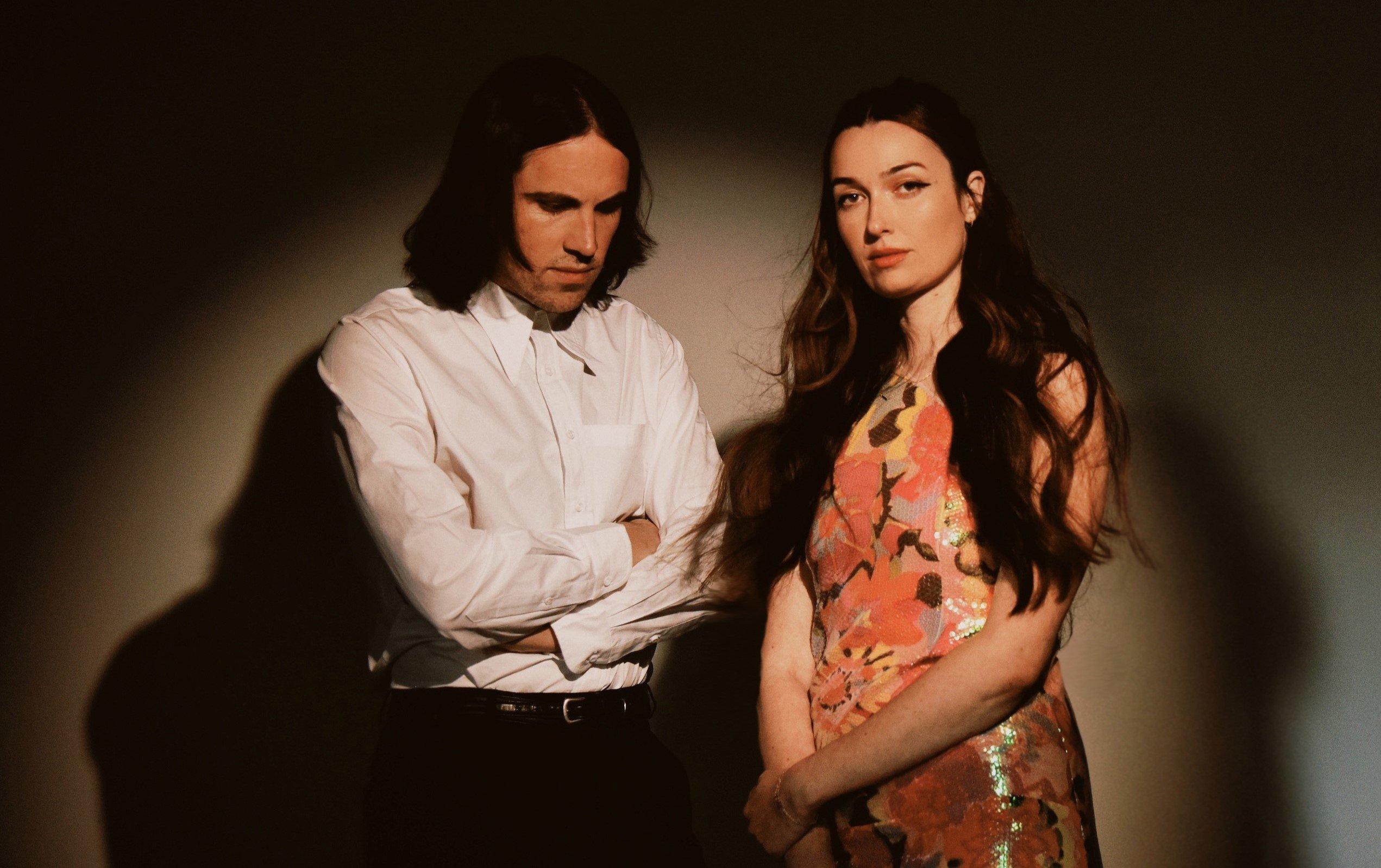
Photo: Shervin Lainez
interview
Cults' Evolution: Madeline Follin & Brian Oblivion Discuss Their Upcoming Album 'To The Ghosts'
Out July 26, Cults' new album reflects their 15-year journey as artists. Ahead of their Lollapalooza performance and U.S. tour, the duo discuss how they've pushed their sound forward.
Over the past 15 years, Cults have captivated audiences with their atmospheric, layered compositions that pack a pop-friendly punch. Now, on the brink of releasing their fifth album, To The Ghosts, on July 26, Madeline Follin and Brian Oblivion reflect on their journey and new creative freedom.
While their previous albums required the duo to stick to deadlines precariously organized between tours, the pandemic provided new circumstances. Freed of distractions and obligations, Follin and Oblivion traveled to Los Angeles in 2022 to join up with their longtime producer Shane Stoneback (Vampire Weekend, Sleigh Bells) to craft an album that looks back on their past while pushing their sound ahead.
"We don't have the sales pitch for the album down yet, but there's no other band that sounds like us," says Oblivion. "We're digging into our thing, and if you're into anything we've done before, you'll love this one."
Adds Follin, "We're like no other."
The album title is addressed to the ghosts of both Oblivion and Follin's past selves. As Oblivion explains, their four prior albums were time capsules that reflected the period in which each album was written and recorded. This release is something different.
To The Ghosts is a personal landmark for Follin, particularly. In 2020, upon the release of Cults' fourth album Host, she admitted that she'd been too shy to bring her own songwriting and demos to the table for the band's first three albums. It was Stoneback's encouragement that altered the creative process for the duo, resulting in their most collaborative album to date, and significantly more reliance upon live instrumentals in the studio.
"We spent a month in an AirBnB then a week in the studio with Shane," explains Follin.
"It was a mad dash to replace all the midi instruments with real ones, so we were running around playing vibraphones, organs, and guitars and all these things we'd recorded in demos and laying it all back down in one week."
It may have been a mad rush at the end, but over the years the duo have refined their formula for making albums. They're no longer the giddy art students and lovers making DIY music with no plans for world domination.
In 2010, Follin and Oblivion founded Cults and released their debut EP "Cults 7", followed by their debut self-titled album in 2011, which was similarly lauded. By the time their sophomore album "Static" arrived in 2013, the pair had freshly broken up and the themes of being creatively and emotionally stagnated resonated in dramatic, spacious orchestral compositions. They followed up with "Offering" in 2017, which was the first of the duo's albums to lean into optimism and a sense of embracing a more pop-friendly path.
That optimistic pop thread is picked up once more in "Crybaby", the first of 10 tracks that kicks off the new album. It launches with a lush, reverb-rich guitar hook and shuddering church bells, then shifts into a calypso beat and Follin's dreamy ode to escaping the modern malaise ("dry your eyes / turn off the screen"). Like the other catchy, bittersweet synth-pop numbers on To The Ghosts, "Crybaby" wraps up in close to three minutes.
The lengthy outliers are "You're In Love With Yourself" and the closing track "Hung The Moon," which runs over five minutes. Ending an album with an epic power ballad is their signature style and "Hung The Moon" bathes in drama, love, loss and redemption. "In a storytelling way, that's the only ending that makes sense to us, a melancholy resolution," Oblivion says.
To The Ghosts captures everything fans adore about Cults and they'll have ample opportunity to catch them performing live this year. The duo are set to return to Lollapalooza opening for Vampire Weekend on Aug. 4, followed by their own headlining U.S. tour the same month.
Ahead of their intensive touring schedule, the duo joined GRAMMY.com on a group video chat from their respective homes in New York’s East Village one evening, to discuss their upcoming release.
This interview has been edited for brevity and clarity.
You began working on this album during the pandemic. Tell me where you wrote and recorded material, and whether you did that together or separately?
Madeline Follin: We were writing and recording in Brian's spare room. Can you see him?
Brian Oblivion: This tiny room! [directs the camera around a room not much bigger than 7 x 10 feet].
Follin: I sat on that couch right there, and we spent a lot of time in that little room [laughs]. For the most part we were together for the entire thing.
**Madeline, you revealed that before making your fourth album Host, you were too shy to show your own music to Brian and producer Shane Stoneback. What broke that barrier down for you to fully participate in the creative process?**
It was really hard to get it out of me. I had really strong imposter syndrome. Even though Brian was just starting out, he had taken a few recording classes in college, so he knew a lot more of the recording lingo and ways of communicating technically. I didn't know, so I felt so nervous to even communicate what I wanted. Shane helped with that a lot in terms of translating what I wanted into the language of studio speak. Shane is unlike any other producer we've worked with. He heard me out.
Tell me about working with Shane Stoneback in terms of what you came into the conversation with, and what he contributed to shaping this album.
Follin: We thought that we were not going to work with Shane again because he'd largely gotten out of the business. During [the] pandemic he switched careers and began working in the movie business. So, we started working with a few other people, we were feeling it out, and it just wasn't working. We reached out to [Shane], and he randomly happened to have 30 days off and said if we can finish it in 30 days, we can do it. We said, "we're coming out tomorrow."
What were the creative decisions you made in the earliest stages, and how much did you change your mind or allow outside ideas in as you were working on this album?
Oblivion: It took us a really long time. We definitely wrote over 100 songs. I put it all on an iTunes playlist and it was over 6 hours of music. This time we got a lot of confidence from some of our older songs being popular with young people. We thought, maybe the time has come around where we can do exactly what we do, and that's kinda 'new' again. Once we went through all the permutations and landed on "Crybaby," which was the first song on the record, we just thought "this just feels like us, so let's lean into what makes us unique." The messing around period was just trying out new tricks and trying to expand our possibilities.
John Congleton has a real knack for guitar sounds and finding a rawness to live instruments. How did he come to mix this album?
Oblivion: I've been a fan of John's going back to Xiu Xiu and my high school days. He's a master of distortion, him and Dave Fridmann, that's their thing. They can make things really fuzzy and interesting, but also fit it all in the speakers in a way that's like a weird magic trick. We have kind of a vintage sound, and he gets that but he's also smart at highlighting things that are new. He mixed our last record too and from the first conversation, in which he said he thinks like a musician and wants to do something strange, we knew we wanted him.
Follin: We'd mixed with other people before but when we got a mix back from John, he was bringing out parts of the song that we hadn't even recalled leaving in there. He makes our songs sound new to us again. We have a lot of trust and respect in him, and we were trying for so long to get our schedules lined up.
Oblivion: We work on our music for so long that by the time it's ready for the mix, we really want to hear something new. It's refreshing for us that John hears something new in us.
Tell me about "Crybaby," the first single. What were you going for in terms of the music, the mood and the message?
Follin: We'd been working on that song as part of the 100 songs that didn't make it. Brian started working on that song and I had never heard anything like that come out of his computer before, and I was shocked. It's funny because people say it's so "Cults sounding", but I thought it was unlike anything we'd done before. It's got a '60s vibe, an island vibe, to me and I thought we needed to zone in on it.
Oblivion: That was at the point where we decided "let's see if we can still make Cults songs that hark back to the earliest record." I love the lyrics, they're simple and there's no hidden meaning, which is great. A lot of the music that we love and that inspired the start of our band, is really obvious but also really weird in terms of lyrics. "Crybaby" is a fun, whacky diss track.
Let's talk about what inspires you musically.
Oblivion: What gets me excited is spending a lot of time sharpening my Spotify algorithm, so every Monday I get a collection of weirdo emotional love songs about heartbreak, these obscure, catchy B-sides, and whenever I find a song like that, I'm so inspired. Something that has kitsch, gravitas, and a bit of humour, that John waters, David Lynch combination lights me up.
Follin: Right now, I'm really into a lot of Fontaines D.C. I felt a 'Cults' vibe from them even though they probably have no idea who we are. It's been a while since I've put on a song, and then I want to put it on again right away.
"Left My Keys" is an anthem for growing up. Tell me about your experience growing up in this band.
Oblivion: What makes this record different is that historically, we'd do all the music together over a span of two years, then Maddy would squirrel away to take a month or two to write all the lyrics, and that made the records very reflective of that moment, that time. For this record, because we had a protracted work schedule with nothing else to do, we took the time to slow down and look back. "Left My Keys'' is about being a teenager, and "Crybaby" is about things that happened a long time ago. Growing up is being comfortable enough to address your own past and realizing everything turned out okay so far. It's the first album where we're looking backwards and processing stuff from the last 15 years and before.
This album feels brighter than 'Host.' What happened between 'Host' and 'To the Ghosts' that explains the transition?
Oblivion: There's a lot of stuff we got out of our system. Host and Offering were both dark records, to me. It's wild to see that young people have picked up on "Gilded Lily" and that was such a crazy, cathartic song for us, so now it is crazy and cathartic for them. Most of my favorite bands are dark, sad bands, but that's not the totality of who we are. Being able to explore both sides of who we are was refreshing for us.
Follin: Personally, we were both feeling a lot better in our lives. We worked through a lot of anxiety, and because of the pandemic there was less partying, clubs, and bars. We had time to get healthier.
Oblivion: In a lot of ways our band is defined by our limitations. We have made music for 15 years, just the two of us with the same producer. But every time we make something new and interesting and all the things we think of as roadblocks help to provide a framework for what we do.
You released 'Host B-Sides & Remixes' in 2022, two years after 'Host.' Are there outtakes, or planned remixes, that are planned for this album too?
Follin: Definitely. 100 percent, we will be having something, but I'm not saying.
Oblivion: It's been really fun with the last few albums to put out songs that showed what would have happened if we went in a different direction. Sharing that part of the process with listeners has been fun.
You have a huge schedule of touring. Tell me about the plans and how you mentally and physically endure all the travel and performances. Does it get easier the more you do it?
Follin: No. Every single night, even if we're in the middle of nowhere, whether there's 15 people or 1000, I almost have a heart attack before walking on stage each night. You're crammed in a box with 7 people every night, there's a lot of emotions…
Oblivion: …and something is always breaking at soundcheck, it's like arghhhh! It's really hard, but when we put out Host and we didn't get to tour for two years, we missed that connection. The feeling of sharing your music with people allows us to move past it and get into something new. It's a big part of our personal growth and experience. We love touring.
Follin: In normal daily life, we hang out together. We hang out on weekends. It's not a forced thing. It feels so good to meet fans every single night, too, and hearing stories of how you affected somebody's life.
Most of the tracks on this album fall at around the three minute mark, and many end quite abruptly without fading out or dwindling down. Was that a deliberate strategy, and then why did "Hung The Moon" require that extended time as the finale?
Oblivion: It's verse-chorus-verse-chorus-bridge-chorus and you're done in three minutes!
Follin: Brian is very concerned about time, and I don't think it matters. I like shorter, he likes longer. We're compromising.
Oblivion: "Hung The Moon" is the big epic ballad that ends the record. We have had one on every record, it always ends with a big power ballad. In a storytelling way, that's the only ending that makes sense to us, a melancholy resolution. I love that song because it starts off as a sweet love song then it gets tense and spooky towards the end, but the lyrics stay really loving. It's that transition between the rush of an initial relationship and then the long game, where it's sweet and delicate, but it's also real life, so you're afraid that you'll lose things and you're trying to hold on to that original thing. So, the album ends on a bittersweet note.
Lollapalooza News
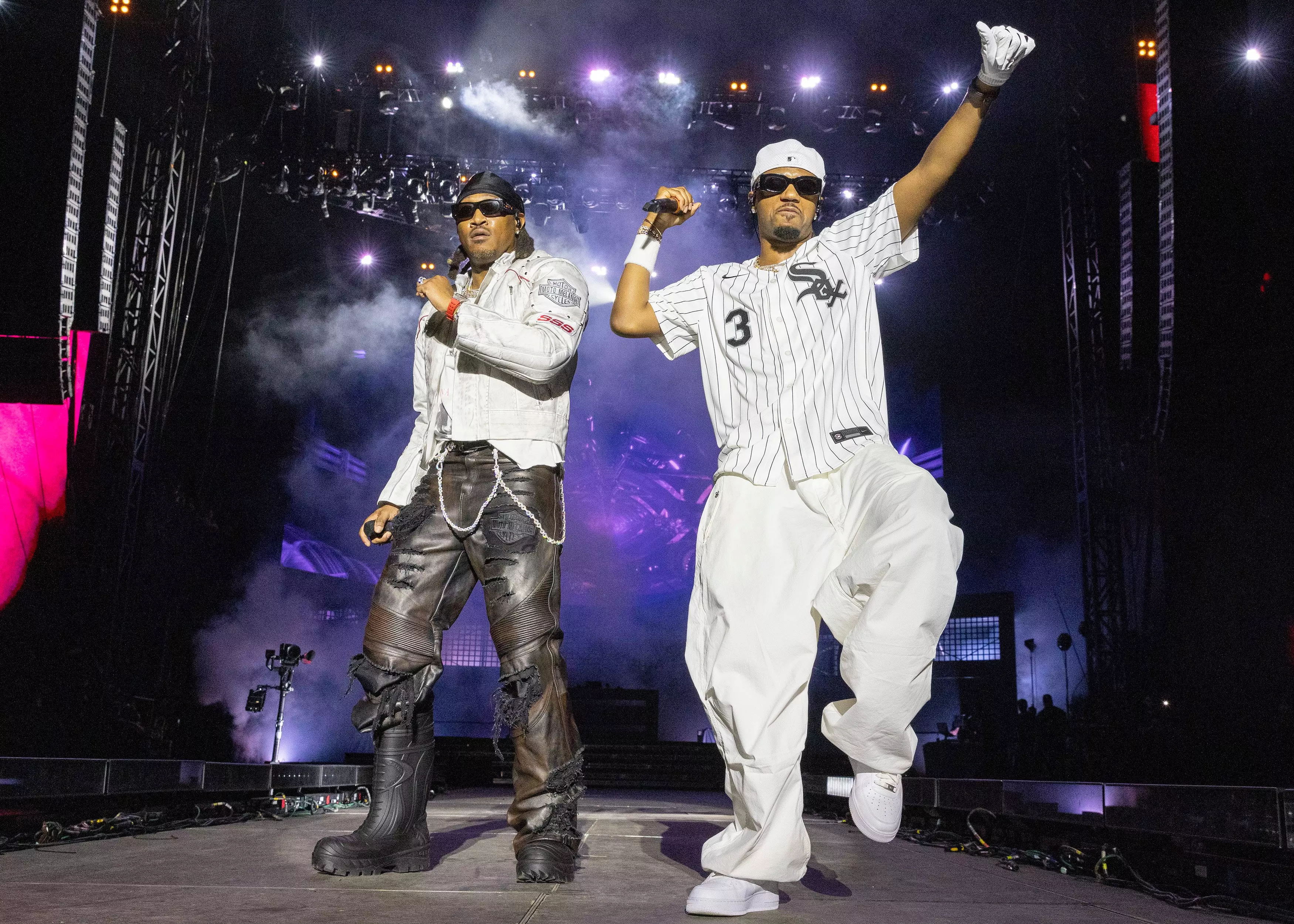
7 Stellar Sets From Lollapalooza 2024: Megan Thee Stallion, Future x Metro Boomin & More
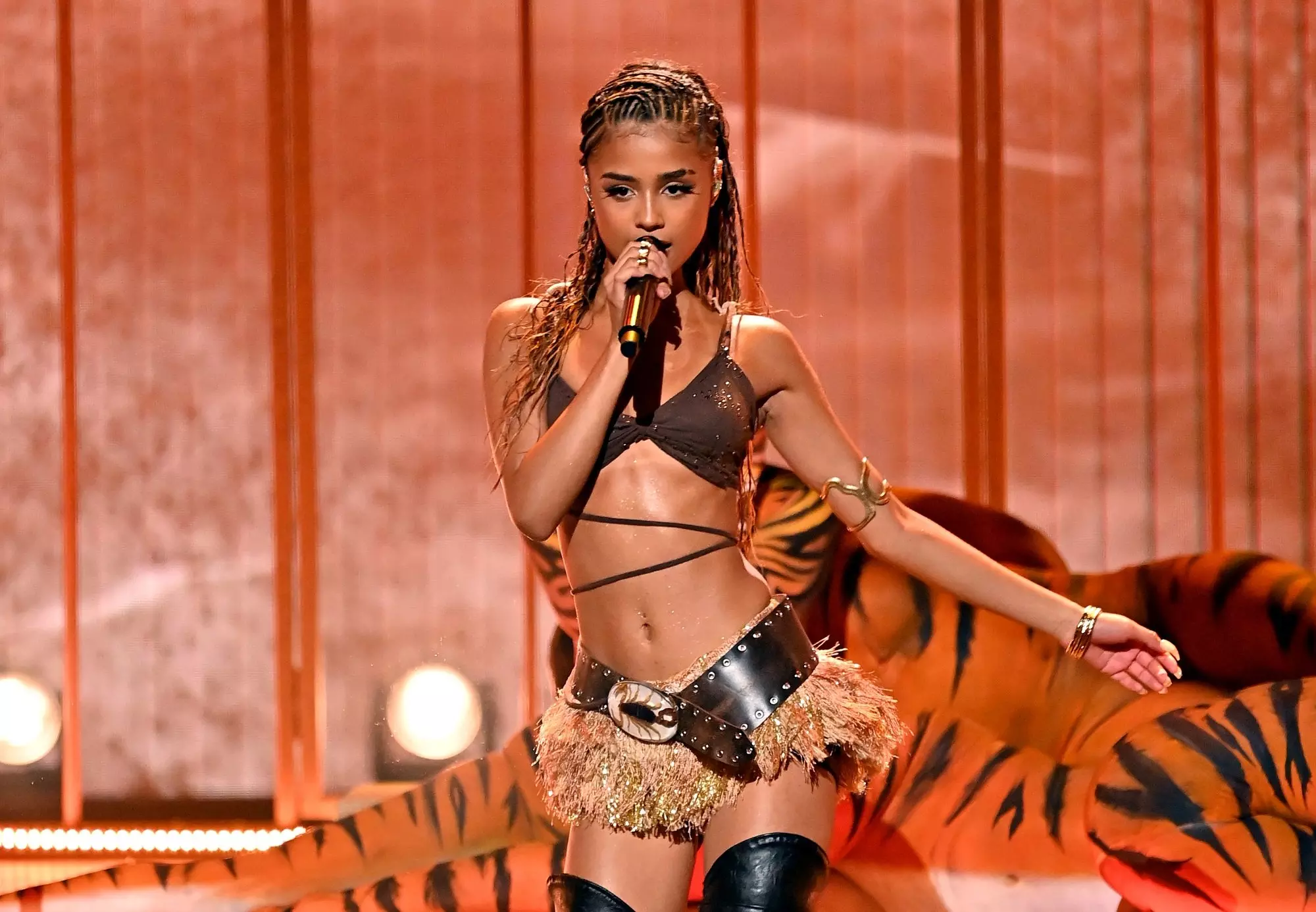
10 Must-See Acts At Lollapalooza 2024: Tyla, SiR, Stray Kids, Dominic Fike & More
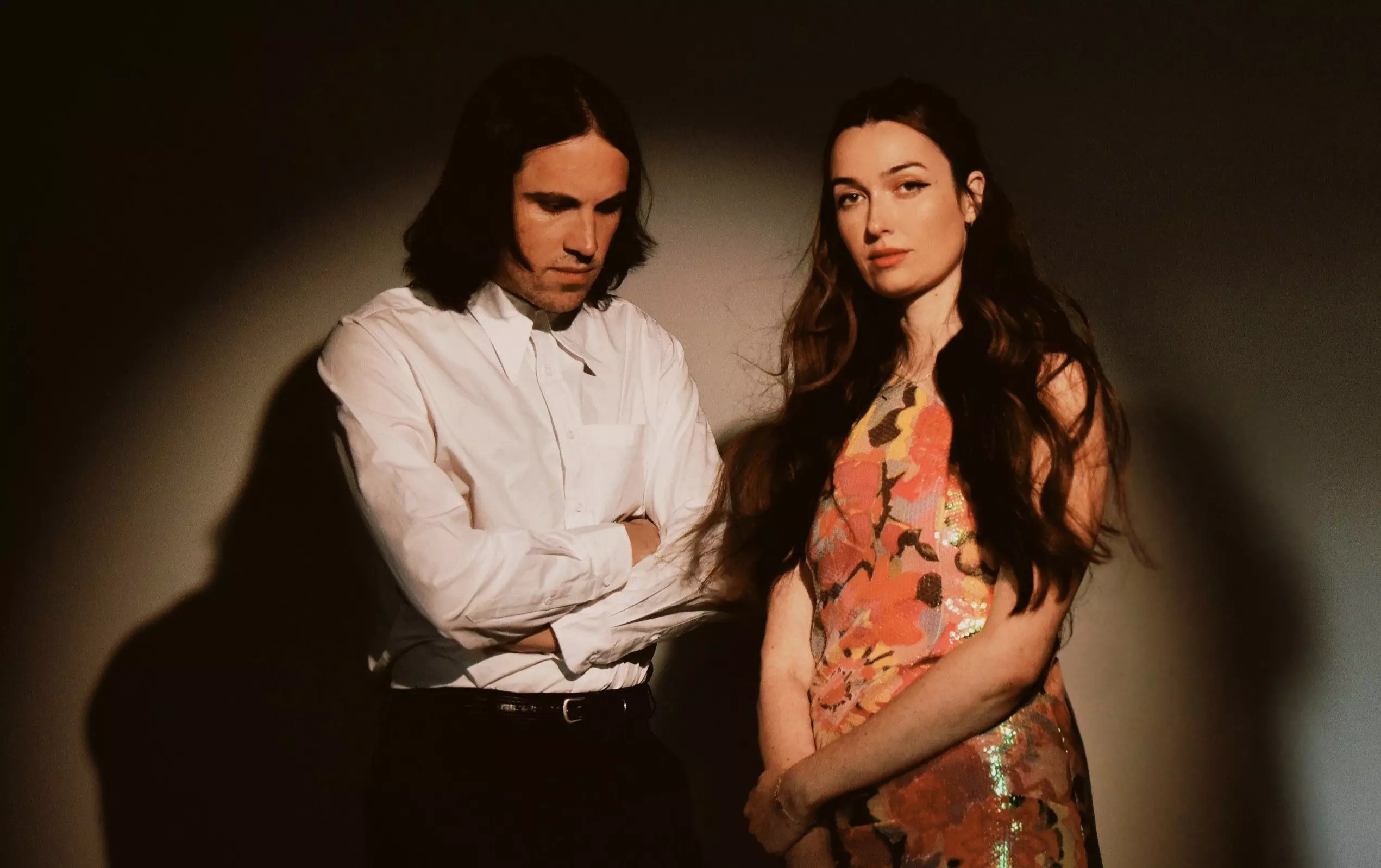
Cults' Evolution: Madeline Follin & Brian Oblivion Discuss Their Upcoming Album 'To The Ghosts'
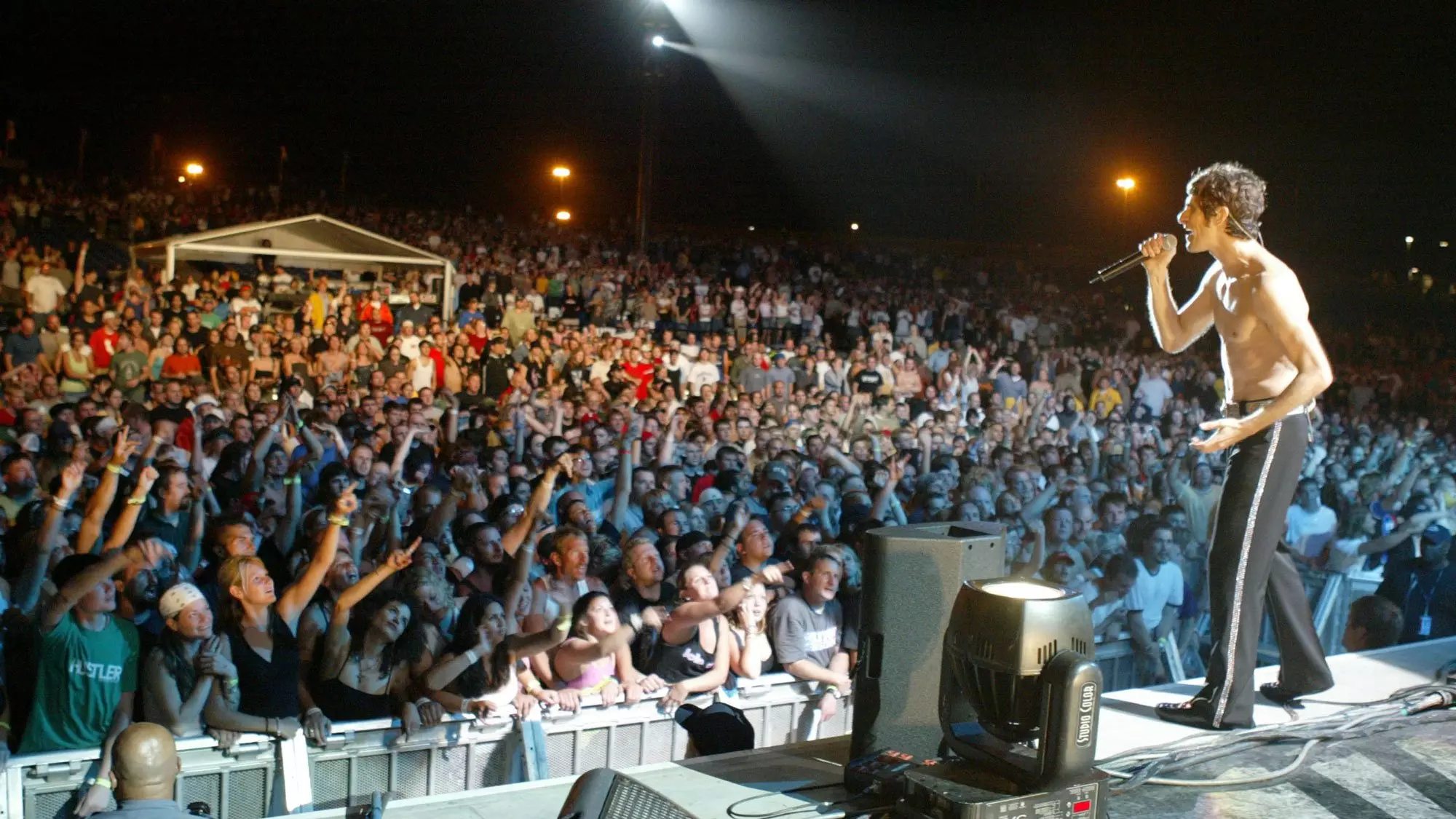
'Lolla: The Story of Lollapalooza' Recounts How An Alt Rock Fest Laid The Blueprint For Bonnaroo & More
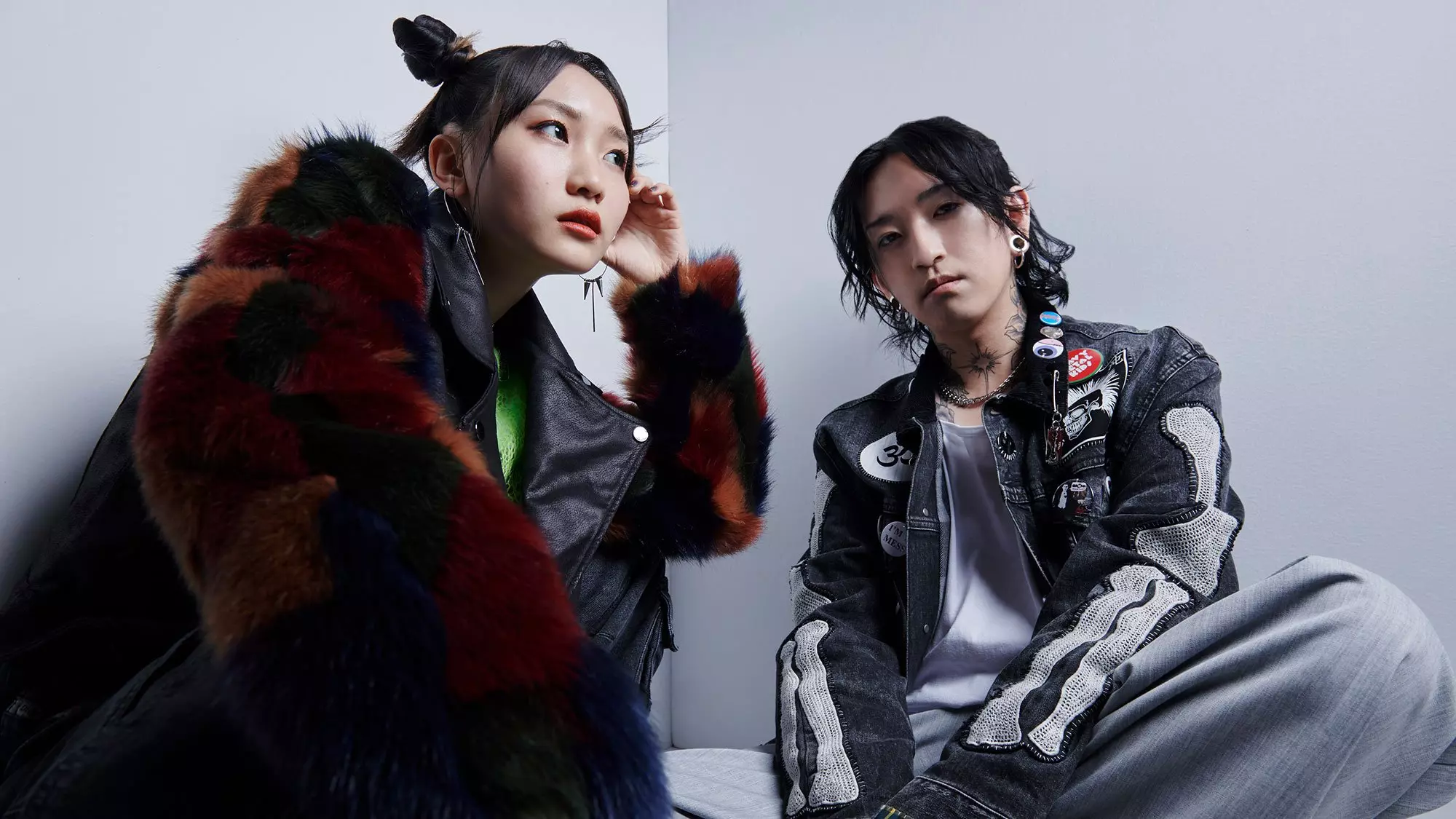
From Tokyo To Coachella: YOASOBI's Journey To Validate J-Pop And Vocaloid As Art Forms
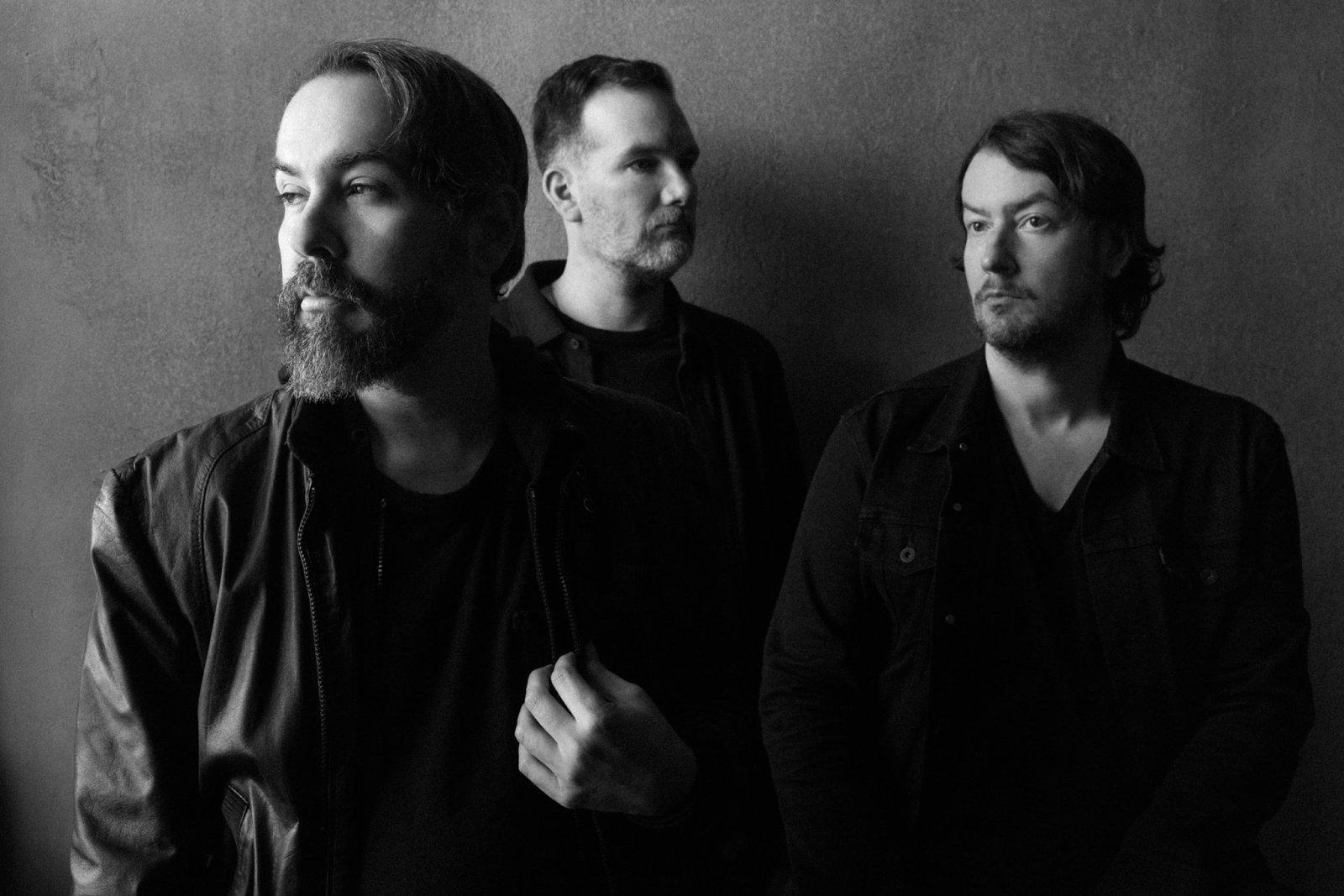
Photo: Ebru Yildiz
interview
X's Mark The Spot: How Cigarettes After Sex Turn Difficult Memories Into Dreamy Nostalgia
"We’re all in the same boat," Greg Gonzalez says of the band’s new album, ‘X’s.' The frontman speaks with GRAMMY.com about how channeling Madonna and Marvin Gaye helped him turn his memories of a relationship into sublime dream pop.
When Greg Gonzalez sat down to start writing the next Cigarettes After Sex album, the dream pop frontman relied equally on memories of heartbreak and the ballads of the Material Girl. "‘90s Madonna was a big influence on this record," he tells GRAMMY.com with a soft smile.
Though the end result won’t be mistaken for anything off of Ray of Light, that timeless, almost mystic cloud of emotionally resonant pop carries a distinct familiarity on Cigarettes After Sex's new album, X’s.
Cigarettes After Sex has championed that sweet and sour dreaminess since their 2017 debut. Two years after that self-titled record earned rave reviews and was certified gold, the El Paso, Texas-based outfit reached even deeper for Cry. And while those records cataloged Gonzalez's heartbreaks and intimacies in sensual detail, Gonzalez knew he could reach deeper on the band’s third LP: "These songs are just exactly as memory happened."
Arriving July 12, X’s fuses Cigarettes After Sex's dream pop strengths with ‘90s pop warmth and ‘70s dance floor glow. Always one to bring listeners into the moment, Gonzalez imbues the record with a lyrical specificity that gives the taste of pink lemonade and the tension of a deteriorating relationship equal weight. On X’s, the listener can feel the immediate joy and lingering pain in equal measure.
"This is specific to me and what I'm going through, but then I go out and talk to people on tour, and they’re like, 'Oh, yeah, I went through the exact same thing,'" Gonzalez says.
Leading up to the release of X’s, Gonzalez spoke with GRAMMY.com about the appeal of ‘90s Madonna, finding a way to dance through tears, and his potential future in film scoring.
Tell me about the production process for this record. You've always been able to build nostalgic landscapes, but this record feels smoother than before. Were there any new touchpoints you were working with?
That was the thing: trying to make the grooves tighter. It was coming from more of a ‘70s Marvin Gaye kind of place, trying to make it groove like a ‘70s dance floor.
Which is an especially interesting place to be writing from when dealing with that line between love and lust.
Yeah. The stuff we've done before was really based on the late ‘50s, early ‘60s slow dance music. But it was always supposed to be dance music; I always wanted Cigarettes to be music you could dance to, even if it was a slow dance.
When I think of pop music and I think of songs that really feel powerful, they usually make you want to groove in some way. I love a lot of music that doesn't do that: ambient music or classical or some jazz. But there's so much power to music that makes you want to move. And I found throughout the years that I could just never get enough of the music that makes you want to dance. So I thought, Okay, the music that I make should be really emotional. It should feel like music you could actually cry to, but in the end it should make you want to also move in that way.
It’s the physical necessity of the music, some forward motion to match the emotional journey. I’d imagine that is related in some sense to the fact that you’re writing in a somewhat autobiographical way. Is that a way of not getting stuck in the stories, in the feelings?
I'm writing it for myself. Of course, I can't help but picture the audience in some way. But it's never like I'm writing it for them.
There is an audience that I can visualize that would like the music. [Laughs]. There have been times where we’re recording and I close my eyes to visualize an arena or a stadium to picture the music in that setting. It’s a nice feeling. And that's just based on the music that I love that I thought had similarities.
Is there any particular music that you love that fills that feeling?
There's so much music that I was obsessed with, but with Cigarettes I narrowed it down. Since I was a kid, I did every kind of style I could do. I was in power pop bands, new wave, electro, metal, really experimental bands.
But when I finally sat down and said, "Let me make an identity for Cigarettes and make it special," I had to think about what my favorite music was and what music affected me the deepest. And it was stuff like "Blue Light" by Mazzy Star or "Harvest Moon" by Neil Young or "I Love How You Love Me" by the Paris Sisters. And I kind of put all that together and that became the sound of Cigarettes. And now I do that every time I make a record: I'll make a playlist of what I want it to feel like. I mentioned Marvin Gaye. I feel like ‘90s Madonna was a big influence on this record.
Madonna in the ‘90s? No one could touch that era. I don't know when the last time you listened to that music was, but…
No, I grew up with Madonna and I used to watch the "Like A Prayer" video on repeat. It blew me away. But then I came back and I got into the ‘90s stuff, like "Take A Bow" and that record Something To Remember. It's all of the slower tunes. And that was a big influence, especially songs like "Rain."
You clearly have a diverse musical appetite, but you’ve also highlighted people with such identifiable voices — something that I think is true for Cigarettes as well. Your vocals are so front and center in the identity of the project.
That's great. The singer pretty much makes the song for me, whatever I’m listening to. The entire spirit comes down to the vocals. I'll hear a song like "Take A Bow" and be like, This feels so special. What if I made something that felt like this? If I told someone this [record] was based on Marvin Gaye and ‘90s Madonna, I don’t know if they would think it really sounded like that. It's more just trying to capture the spirit of what those records feel like.
That's what's cool about it too: You can remember those songs that were filling the air back in the ‘90s and what those feelings were, what you were up to, and draw a line between that and whatever's happening now that I wrote about.
You don’t seem like the type of person to avoid negative feelings when you come up against them in that process either. The songs feel like you just embrace it, even if it's really painful.
I've always felt that's the best way for me to go through things, to face it head on. It's supposed to be painful. You have all these really great moments with somebody and all these great memories, and then when it ends, honestly, that's the way it goes, right? That's the trade off.
Yeah, but not everybody goes through a breakup and then makes an album about it. Isn’t that like returning to the scene of the crime? How does it feel to deal with it in that way?
That's funny. The thing was, I was writing a lot of this stuff while I was still in a relationship. It took so long to finish it.
Finish the album or finish the relationship? [Laughs.]
Actually both. But yeah, the record is mostly about that one relationship, but there are little diversions with some of the songs. A lot of the key images and songs are based on that romance and little memories that I took from it.
I like that I have all those moments kind of set in stone. It’s hard to listen to this record too because I'll just really see these moments, all these memories, and it can be a bit much to flash back to all that stuff and see it so vividly. But I love that I have it. Those memories meant so much and I’m glad that they're collected and displayed in this way.
And you were able to collect them when it was happening as opposed to having some time between, which could warp those memories. Writing and recording when you’re as raw as possible makes sense, so what you capture is really honest.
That's why I like to write these songs that are as honest as possible or as autobiographical as possible, with a lot of details. If I'm writing a song and someone heard it, they would know it was about them just based on all the imagery that's in that song. It's like a little letter to them. It could be like a secret little letter to someone.
That makes me think of "Holding You, Holding Me," which is so lovely and feels as immediate as anything you’ve done.
It was the pandemic, and then the other girlfriend I had at that time, we were living in downtown L.A. and just wanted to get out of the house and stay somewhere nicer for a while. And we went to this AirBnb that was in Beverly Hills with this beautiful backyard. The song was meant to be kind of Fleetwood Mac-ish, like "Gypsy" or "Sara", that nice ‘70s country pop feel.
Over the years I’ve noticed you frequently use taste as a sensory link in your songs, which really creates an evocative moment — I’m thinking about references to candy bars and lemonade on this album. What is it about that sense that sticks out to you?
If I'm going back to memory, then that's just what really happened. We went to the store to go buy wine and candy because that was the vibe that night. "Let’s watch movies and get red wine and some candy bars." And it was just a big memory that we walked outside and it started raining. I think too, what's nice about using objects is that it gives you so much mood in a song. You can tell what the feeling is of that moment when you put those things together.
And it can have an almost universal understanding. People will understand what it means to have a "candy bar night."
That's the craziest thing. It's almost like you're trained to write universally, meaning generically. Like, "Oh, this is a song that everyone can like and the lyrics can be really simple." But I’ve found that the songs that are really detailed and were more personal stories, a song like "K." from Cigarettes After Sex, those are the songs that everyone really loves, the ones that take up being really specific.
I suppose that's pop's way of being a doorway. When you're talking about your personal experiences, somebody is going to enter into it and feel like you're singing about theirs.
You realize that we're all in the same boat. This is specific to me and what I'm going through, but then I go out and talk to people on tour, and they’re like, "Oh, yeah, I went through the exact same thing." I feel very lucky that most people I talk to that love [our] music are always saying that. It’s so special.
It makes me trust my instincts. That's the hard thing when you're writing. You're wondering, Is this too much to disclose? Is this too much information? [Laughs.] That instinct is really important to know, to trust it. That's the tough one. That's what's also therapeutic about it too. You want to share things that feel really personal because then you can process them. You can really start to unpack what those moments meant and what they can mean going forward. It gives me more confidence when I hear that kind of stuff from people.
What then is it like when you sing it for a crowd? You’re performing, but you can’t fully separate the emotion that inspired that song.
That's tough because, ideally, if I did my job well enough writing the song, then it should be hard to sing live — especially if I really see those moments when I'm singing it. It could bring me to tears, honestly, because it should feel that intense. And it's even worse if I look in the crowd and someone's crying. I can't even look at them. And that happens very often. If I started crying, my voice will stop.
That brings a real cinematic feeling to your music too, which makes me think you’d be good at scoring a film. Is that something you’d tackle?
I'm definitely obsessed with film and have been since I was a kid. The idea that I keep saying — and I almost feel like I'm going to jinx it because I keep saying it too much — is that I really want to direct and write something. And I've written some ideas down for screenplays and things. It seems like it's hard to transition from musician to filmmaker and really make it stick. But that would be something I want to do in the next 10 years. I'm giving myself 10 years. [Laughs.]
Latest News & Exclusive Videos

Watch Ray Charles Win Album Of The Year In 2005
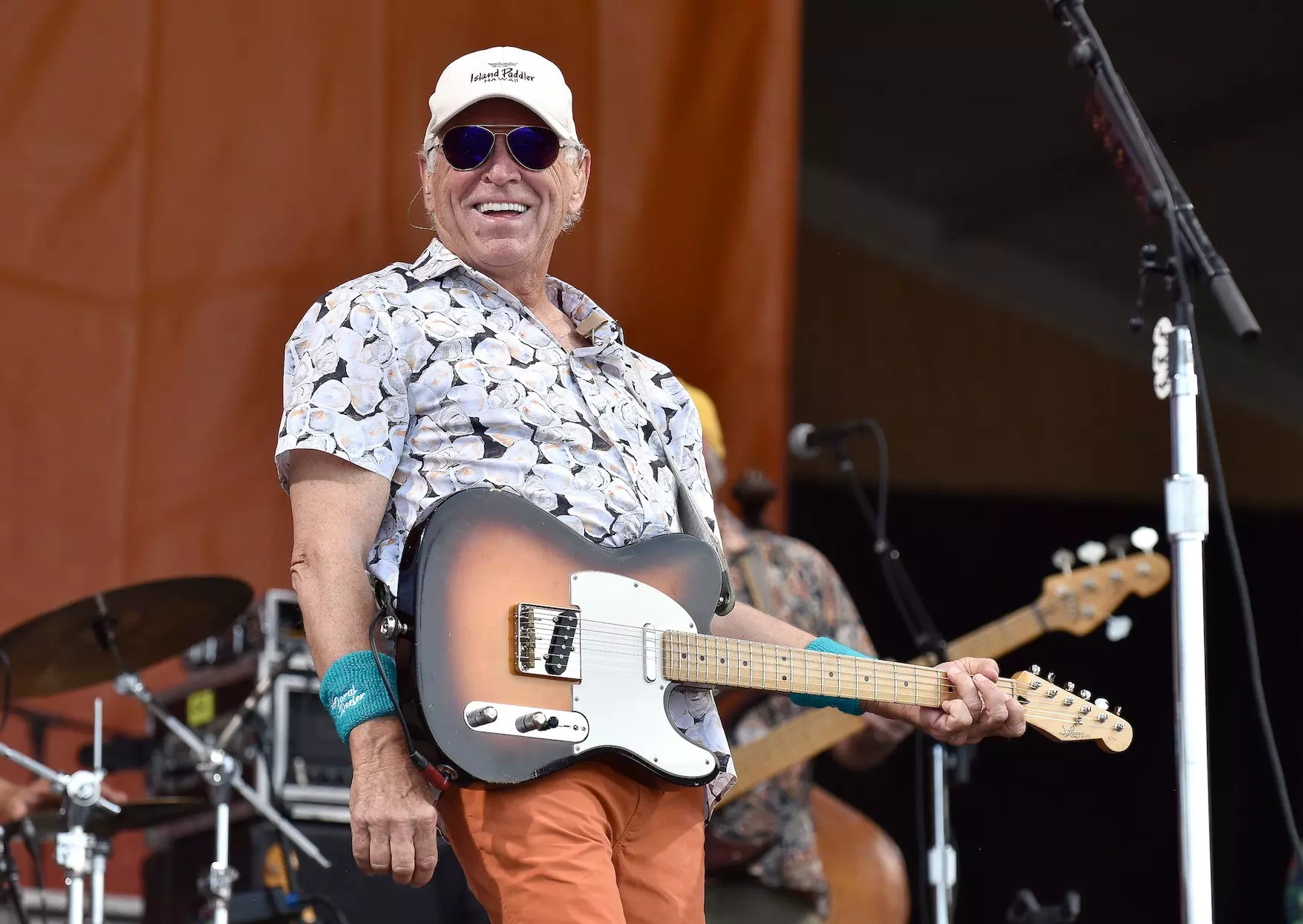
A Pirate Looks At Infinity: Jimmy Buffett's Legacy In 15 Songs
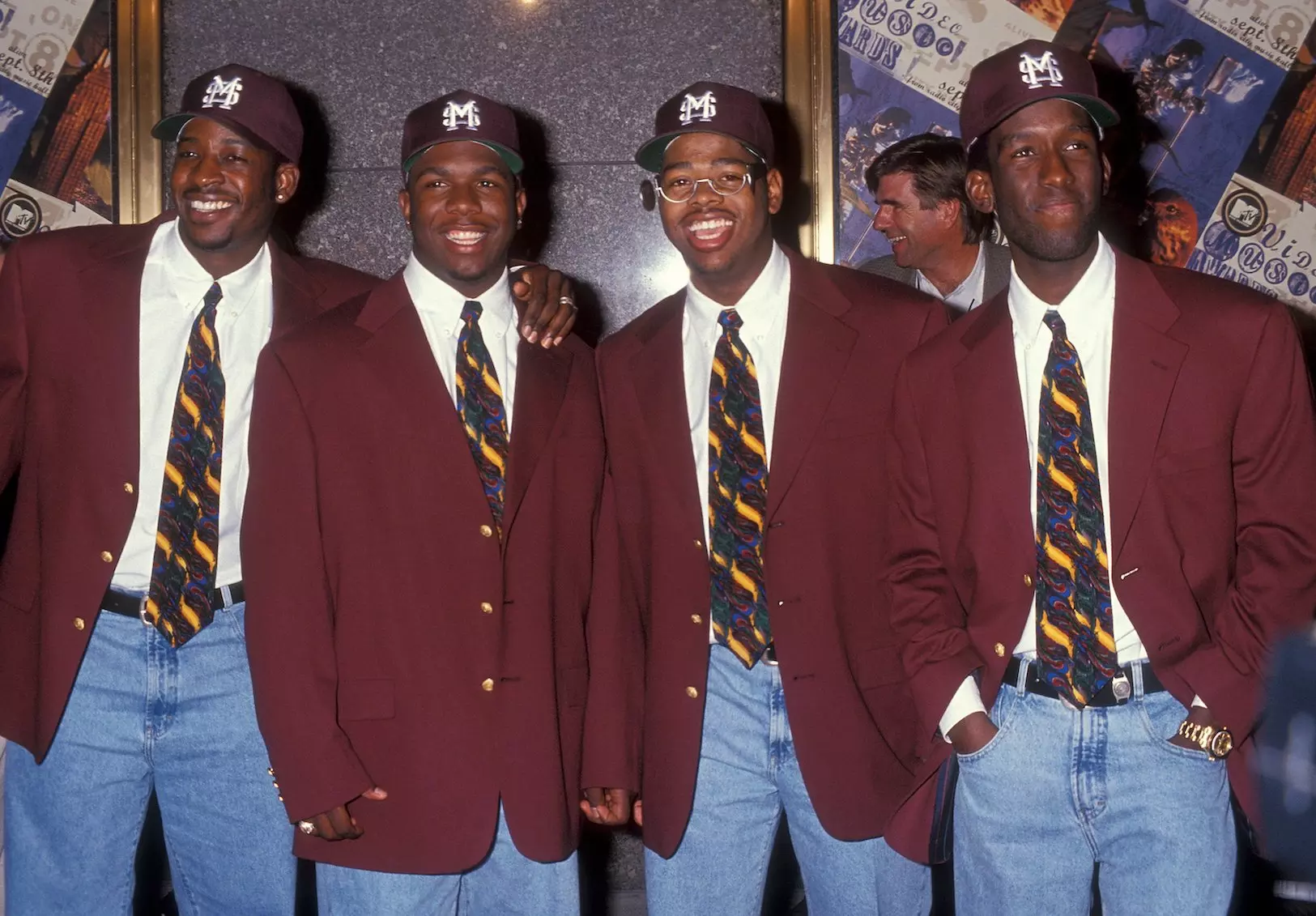
8 Reasons Why Boyz II Men's 'II' Was The '90s Ultimate R&B Blockbuster
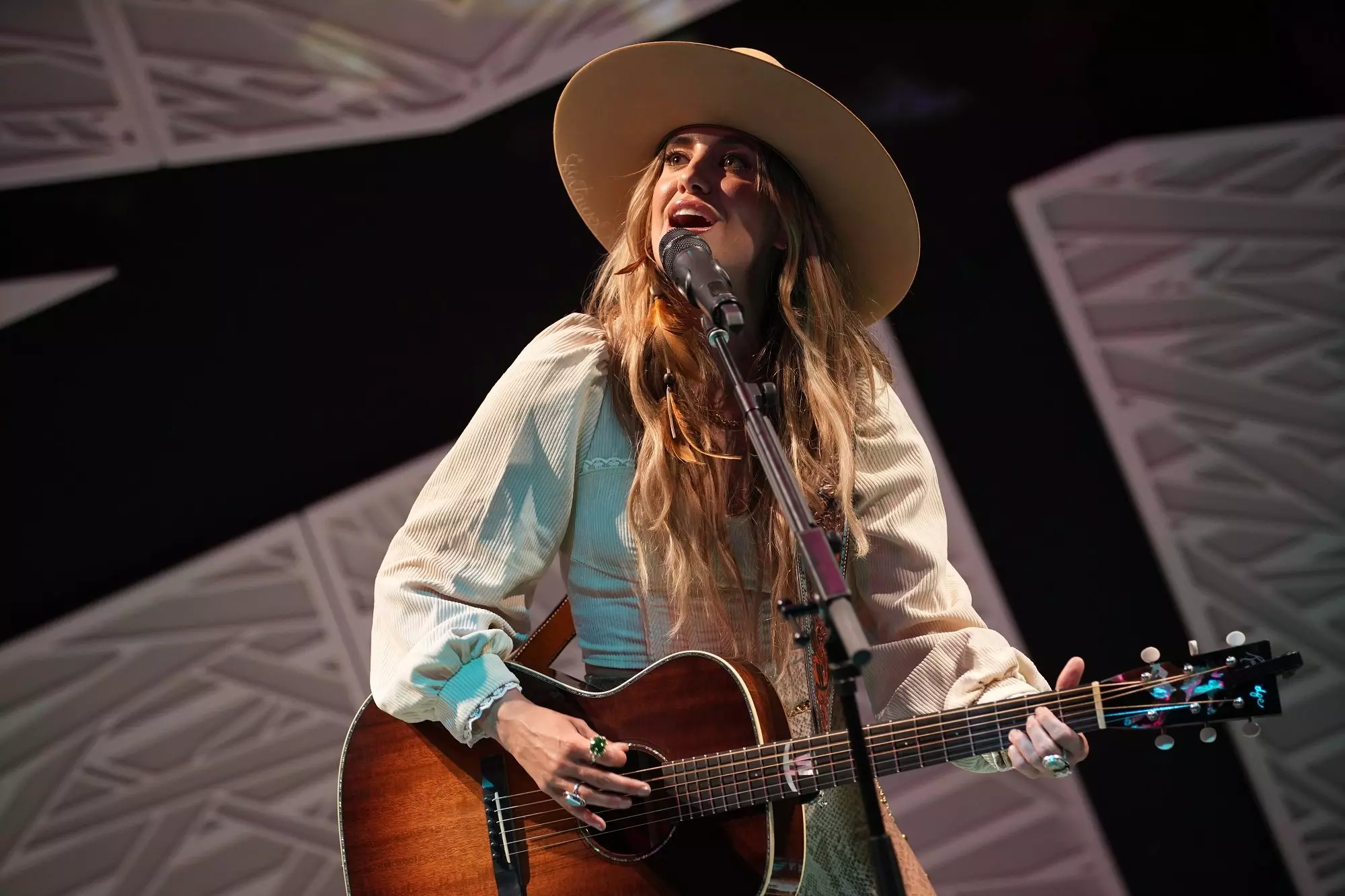
20 Live Events At The GRAMMY Museum This September: Experience Orville Peck, Kate Hudson, Tierra Whack & More

Watch Wunderhorse Perform "July"
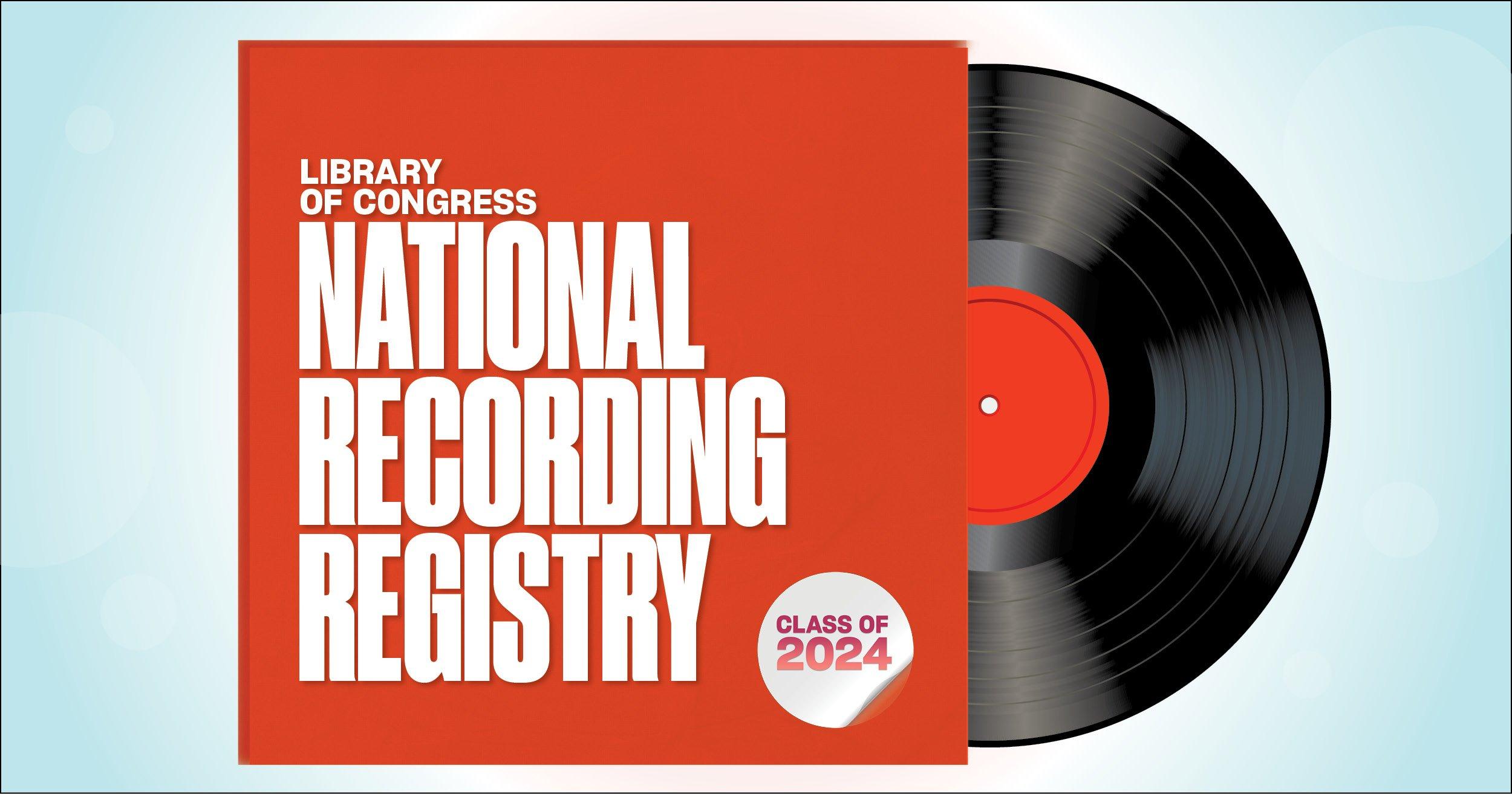
Photo: Library of Congress
news
National Recording Registry Inducts Music From The Notorious B.I.G., Green Day, Blondie, The Chicks, & More
Recordings by the Cars, Bill Withers, Lily Tomlin, Doug E. Fresh and Slick Rick, and the all-Black 369th U.S. Infantry Band after World War I are also among the 25 selected for induction.
As a founding member of the National Recording Preservation Board, the Recording Academy was instrumental in lobbying and getting the board created by Congress. Now, the Library of Congress has added new treasures to the National Recording Registry, preserving masterpieces that have shaped American culture.
The 2024 class not only celebrates modern icons like Green Day’s punk classic Dookie and Biggie Smalls' seminal Ready to Die, but also honors vintage gems like Gene Autry’s "Rudolph, the Red-Nosed Reindeer" and Perry Como’s hits from 1957. These recordings join over 650 titles that constitute the registry — a curated collection housed within the Library’s vast archive of nearly 4 million sound recordings.
Librarian of Congress Carla Hayden announced these additions as essential pieces of our nation’s audio legacy, each selected for their cultural, historical, or aesthetic importance. This selection process is influenced by public nominations, which hit a record number this year, emphasizing the public's role in preserving audio history.
Read more: Inside Green Day's Intimate "Right Here, Right Now" Global Climate Concert In San Francisco
"The Library of Congress is proud to preserve the sounds of American history and our diverse culture through the National Recording Registry," Hayden said. "We have selected audio treasures worthy of preservation with our partners this year, including a wide range of music from the past 100 years, as well as comedy. We were thrilled to receive a record number of public nominations, and we welcome the public’s input on what we should preserve next."
The latest selections named to the registry span from 1919 to 1998 and range from the recordings of the all-Black 369th U.S. Infantry Band led by James Reese Europe after World War I, to defining sounds of jazz and bluegrass, and iconic recordings from pop, dance, country, rock, rap, Latin and classical music.
"For the past 21 years the National Recording Preservation Board has provided musical expertise, historical perspective and deep knowledge of recorded sound to assist the Librarian in choosing landmark recordings to be inducted into the Library’s National Recording Registry," said Robbin Ahrold, Chair of the National Recording Preservation Board. "The board again this year is pleased to join the Librarian in highlighting influential works in our diverse sound heritage, as well as helping to spread the word on the National Recording Registry through their own social media and streaming media Campaigns."
Tune in to NPR's "1A" for "The Sounds of America" series, featuring interviews with Hayden and selected artists, to hear stories behind this year’s picks. Stay connected to the conversation about the registry via social media and listen to many of the recordings on your favorite streaming service.
For more details on the National Recording Registry and to explore more about the selections, visit The Library of Congress's official National Recording Registry page.
National Recording Registry, 2024 Selections (chronological order)
"Clarinet Marmalade" – Lt. James Reese Europe’s 369th U.S. Infantry Band (1919)
"Kauhavan Polkka" – Viola Turpeinen and John Rosendahl (1928)
Wisconsin Folksong Collection (1937-1946)
"Rose Room" – Benny Goodman Sextet with Charlie Christian (1939)
"Rudolph, the Red-Nosed Reindeer" – Gene Autry (1949)
"Tennessee Waltz" – Patti Page (1950)
"Rocket ‘88’" – Jackie Brenston and His Delta Cats (1951)
"Catch a Falling Star" / "Magic Moments" – Perry Como (1957)
"Chances Are" – Johnny Mathis (1957)
"The Sidewinder" – Lee Morgan (1964)
"Surrealistic Pillow" – Jefferson Airplane (1967)
"Ain’t No Sunshine" – Bill Withers (1971)
"This is a Recording" – Lily Tomlin (1971)
"J.D. Crowe & the New South" – J.D. Crowe & the New South (1975)
"Arrival" – ABBA (1976)
"El Cantante" – Héctor Lavoe (1978)
"The Cars" – The Cars (1978)
"Parallel Lines" – Blondie (1978)
"La-Di-Da-Di" – Doug E. Fresh and Slick Rick (MC Ricky D) (1985)
"Don’t Worry, Be Happy" – Bobby McFerrin (1988)
"Amor Eterno" – Juan Gabriel (1990)
"Pieces of Africa" – Kronos Quartet (1992)
Dookie – Green Day (1994)
Ready to Die – The Notorious B.I.G. (1994)
"Wide Open Spaces" – The Chicks (1998)
21 Albums Turning 50 In 2024: 'Diamond Dogs,' 'Jolene,' 'Natty Dread' & More
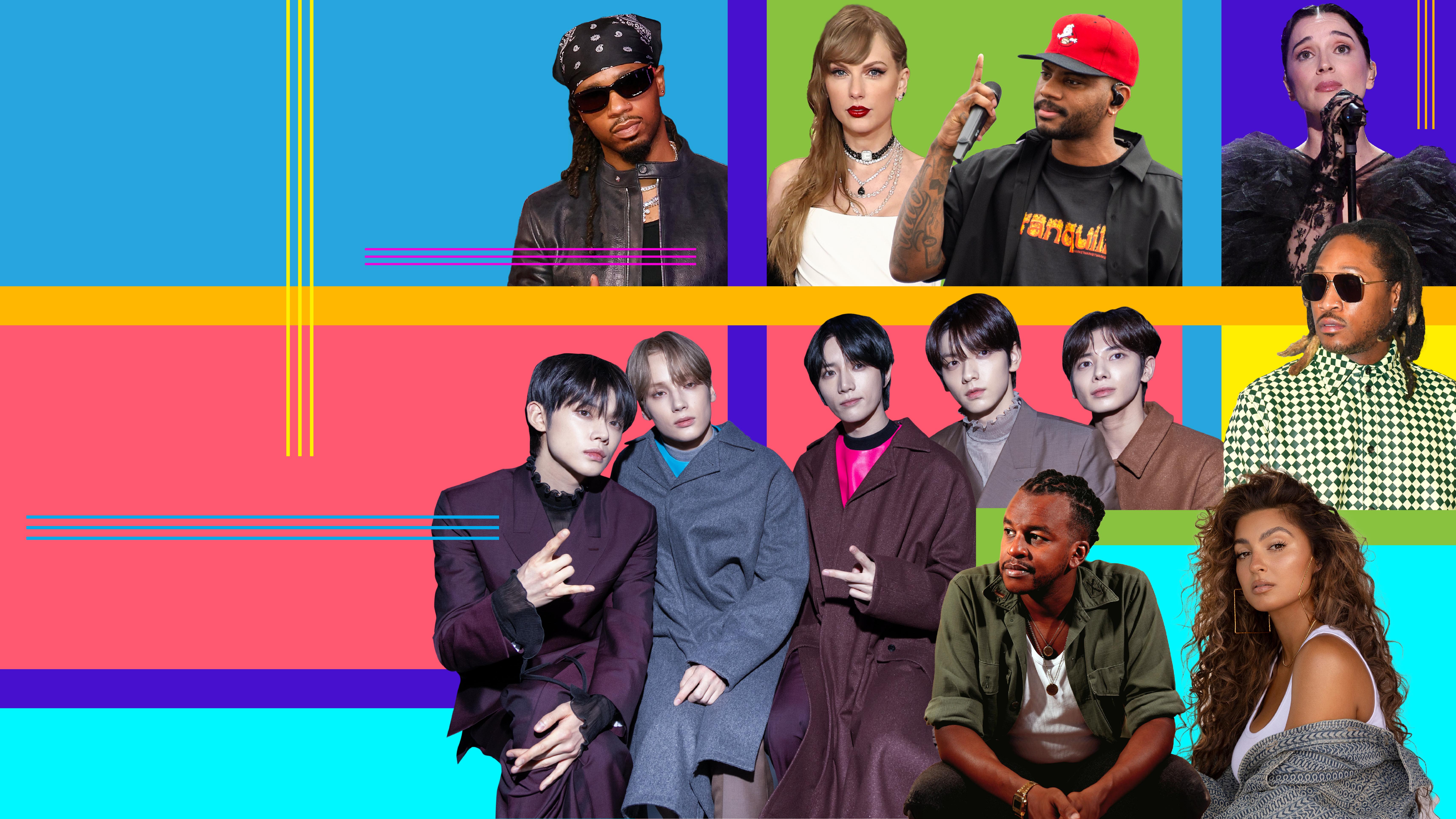
Photos: Taylor Hill/Getty Images; Kevin Mazur/Getty Images for The Recording Academy; Joseph Okpako/WireImage; Chloe Morales-Pazant; Mike Coppola/WireImage; Sasha-Samsonova; Prince Williams/WireImage; Peter White/Getty Images
list
15 Must-Hear Albums In April 2024: Taylor Swift, Vampire Weekend, St. Vincent & More
April promises to shower listeners with heavy-hitting hip-hop, pop, country and rock releases. From Metro Boomin and Future's upcoming collab, to TOMORROW x TOGETHER's new minisode, get your April 2024 playlist ready with 15 exciting new releases.
This year, April brings more than just showers to beget May flowers. Instead, there must be something in the stars: In the fourth month of 2024, four artists are releasing their fourth studio albums. These are pop-rock band X Ambassadors’ Townie, R&B singer Bryson Tiller’s Bryson Tiller, rapper PartyNextDoor’s P4, and Irish rockers Picture This’ Parked Car Conversations.
Numerology aside, April will also contemplate exciting new works from pop masters Taylor Swift, whose The Tortured Poets Department drops mid-month, and St. Vincent’s All Born Screaming, country star ERNEST’s Nashville, Tennessee, jazz master Kenny Garrett and electronic producer Svoy’s What Killed AI?, and — allegedly — the second part of Future and Metro Boomin’s first joint-effort, We Don’t Trust You.
There’s music for all tastes ready to fill your playlists for the rest of the year. Read on for 15 of the most exciting albums dropping in April 2024.
TOMORROW X TOGETHER - minisode 3: TOMORROW
Release date: April 1
Luckily, fans of the K-pop quintet TOMORROW X TOGETHER (TXT) rarely have to wait for new music. Six months after releasing their third studio album, The Name Chapter: Freefall, the group is gearing up to release minisode 3: TOMORROW.
The seven-song EP is fronted by upcoming lead single "Deja Vu," which is said to mix trap, rage, and emo rock into their signature emotional intensity, as per a press release. The other tracks continue to expand the group’s versatility, experimenting with pop rock, house, and acoustic guitars.
As usual, the concept of the album is connected to TXT’s overarching lore, and features several references to their past works — track "- --- -- --- ·-· ·-· --- ·–," for example, evokes their debut era where Morse Code was used in teasers and in the single "Crown."
TXT will embark on their Act: Promise World Tour starting May 3-5 in Seoul, South Korea, and then head to the U.S. for 11 shows across the country, including two dates at New York’s Madison Square Garden.
Conan Gray - Found Heaven
Release date: April 5
Gen Z popstar Conan Gray has Found Heaven. After 2022’s Superache, his upcoming third album was co-produced by legendaries Max Martin, Greg Kurstin, and Shawn Everett, among others.
Gray had been teasing the 13-track record since last year with a slew of buoyant, '80s-tinged singles ("Never Ending Song," "Killing Me" and "Lonely Dancers") and poignant, Elton John-esque ballads ("Winner," "Alley Rose"). "When I was making the album, I was really obsessively listening to music of that era," he explained to NME. "I think also, because it was a deeply emotional time, I was almost hiding from reality. I didn’t listen to a song from the 2020s during the making of this album."
To celebrate this new, holy era, Gray will be touring Australia in July, North America in September and October, and Europe and the UK in November. "I want people to know that I was having fun and goofing around, and I want you to smile and I want you to feel like you can just be yourself," he added. "I just want the album to be a reminder to people that you can be so many things all at once."
Sinkane - We Belong
Release date: April 5
Ahmed Gallab, the Sudanese American multi-instrumentalist behind Sinkane, has built his discography resisting musical genres. We Belong, his upcoming eighth studio album, is no different: it combines pop, funk, electronic, afrobeats, disco, and more into "a love letter to Black music," per a press release.
Sinkane’s first album since 2019’s Dépaysé, We Belong features 10 tracks and participations by Bilal, Money Mark, STOUT, and others. Each song tells the story of a different era in Black music and history, laced with love and hope for the future: the disco groove of "Come Together," the gospel choirs of "Everything Is Everything," the funky bassline of "How Sweet is Your Love."
Along with live band the Message, Sinkane has announced a select 10-city tour in the U.S., starting May 3 in New York City and wrapping up on June 9 in Pioneertown, California.
X Ambassadors - Townie
Release date: April 5
**Pop rock trio X Ambassadors dive deep into nostalgia for Townie, their fourth studio album. The record was inspired by their experience of growing up in the small city of Ithaca, New York, and how it shaped who they are.**
"As a grown man, I’ve fallen back in love with upstate NY, and I oddly feel blessed to have had something to rally so hard against/fight to escape from as a kid," vocalist Sam Harris said in a statement. "No Strings," the first single off the project, is an anthem for that restless feeling, and anchors their concept in a haunting, propulsive melody. "Your Town" and "Half-Life" continue the journey, although taking more melancholy tones.
X Ambassadors first set off their Townie tour in Europe and the UK during February and March. On the day of the release, they will begin the North American leg of the tour in Vancouver, Canada.
Vampire Weekend - Only God Was Above Us
Release date: April 5
Five years after releasing their latest record, 2019’s Father of the Bride, indie band Vampire Weekend will drop their fifth studio album, Only God Was Above Us.
According to a press release, frontman Ezra Koenig wrote most of the songs in 2019-2020, and spent the last five years refining them with bandmates Chris Baio and Chris Tomson. The result is a collection of 10 "direct yet complex" tracks, "showing the band at once at its grittiest, and also at its most beautiful and melodic," as seen in singles "CAprilicorn," "Gen-X Cops," and "Classical."
In addition to a sold out performance in Austin, Texas that will coincide with the total eclipse on April 8 and a headline show at Primavera Sound festival in Barcelona, Vampire Weekend has announced an extensive North American tour throughout summer and fall.
Bryson Tiller - Bryson Tiller
Release date: April 5
Grab your tickets to Bryson Tiller’s upcoming tour while you can: he might go on a hiatus right after. That’s what the R&B singer and rapper told Complex, alleging that his number one passion is actually video games. "I've been designing a game for the past three years; been looking into internships for different companies. That's what I want to prioritize after this album comes out."
The album Tiller refers to is his eponymous fourth LP, a 19-track collection that includes a feature by Victoria Monét, and is described as "seamlessly blending R&B, dancehall, pop, drill, trapsoul, neo-soul, and hip hop" in a press release. "Bryson Tiller is not just an album; it's a declaration of artistic independence and a tribute to the relentless pursuit of greatness."
The project’s three alluring singles ("Outside," "Whatever She Wants," and "CALYPSO") exemplify how Tiller pushed the boundaries of R&B even more, and solidified his identity as one of music’s most singular artists. "My No. 1 goal with this album is just for everybody on Earth to hear it one time," Tiller also told Complex. "My guarantee is that they'll love [at least] one song."
Tori Kelly - TORI.
Release date: April 5
"You think you know who Tori Kelly is, but this album will prove that maybe you didn’t," said the YouTube-star-turned-singer in a NME interview about her fifth studio album, TORI. "I feel like I’m stepping into my power and owning my craft."
Her first LP since 2020’s A Tori Kelly Christmas, TORI. took inspiration from '90s and early aughts R&B and pop, as heard on singles "Missin U" and "Cut." "I was trying to create this world of nostalgia, but also there’s that balance with [TORI.] feeling fresh and new," she said. Comprising 15 tracks, it also includes participations by Ayra Starr in "Unbelievable," LE SSERAFIM’s Kim Chae-won on "Spruce," and Jon Bellion — who co-wrote and produced the album — on "Young Gun."
During the creation process, Kelly told Bellion that her guidelines were to be able to "belt out [songs] in the car" and "dance" to them, like one can do in the powerful "High Water." As far as it goes, it looks like they accomplished their mission.
Kelly will kick off her Purple Skies North American tour on April 12 in Ventura, California, and conclude it on May 3 in Kansas City, Missouri.
Future & Metro Boomin - TBA / We Still Don’t Trust You
Release date: April 12
Rap titans Future and Metro Boomin have been personal friends and work peers for over a decade, but their first collaborative album is only coming out now. We Don’t Trust You, the first installment of a double album, dropped on March 22, while the second part — titled yet to be announced — is slated to release on April 12.
In We Don’t Trust You, the duo showcased their flawless chemistry with grandiose tracks, haunting trap beats, and star-studded features, such as "Like That" with Kendrick Lamar, "Young Metro" with The Weeknd, and "Type S—" with Travis Scott and Playboi Carti. As Metro defined in an interview with Complex, "it’s the classic Future and Metro, but just updated."
So far, no further details have been shared about the second album, but expectations remain high for the duo to outdo the first effort.
girl in red - I'M DOING IT AGAIN BABY!
Release date: April 12
"I wanted to sincerely apologize for the events that happened directly after the release of my second album, I'M DOING IT AGAIN BABY!" prefaced Norwegian singer girl in red — real name Marie Ulven — on a solemn social media video last month. But while viewers caught their breaths, she revealed it was all a witty joke: the album will only come out on Aprilil 12.
"This is a big year for me. 2024 is, like, my year," she added in the video. I'M DOING IT AGAIN BABY! follows Ulven’s 2021 debut If I Could Make It Go Quiet, but feels "more fun and more playful, and a little bit more confident," as she told Billboard. Lead track "Too Much" brings that novelty heads on, while singles "Doing It Again Baby" and "You Need Me Now?" with Sabrina Carpenter prove that Ulven’s powerful pop is only getting better.
Ulven will kick off her Doing It Again tour from April 16-June 2 in North America, and from Aug.27-Oct. 5 in Europe.
Kenny Garrett & Svoy - Who Killed AI?
Release date: April 12
For his first electronic foray, NEA Jazz Master and GRAMMY-winning saxophonist Kenny Garrett enlisted the acclaimed producer-musician Svoy. The result is Who Killed AI?, a seven-track daring exploration of jazz and pop culture.
"The first two songs are really reminiscent of Miles [Davis]," Garrett shared in a statement. "The way I’m stretching the melody — that’s how I played with Miles." The opener and lead single "Ascendence" is a strong preview of what’s to come: distorted synths and drum and bass beats fused with Garrett’s fun and brilliant lines, a compelling portrait of what the future of music can be.
Later in the year, Garrett plans to take the album on a live tour. "I think my fans will find this interesting," Garrett shared in a statement. "Some people forget that my teacher was Miles Davis. So for me, it’s not that I have to do something different. It is just something that I do. All you have to do is present the music and let them take the journey."
ERNEST - Nashville, Tennessee
Release date: April 12
Early in March, singer/songwriter ERNEST announced on social media that he would be running for mayor in order to "legalize country music." Of course, fans started to get their hopes up for new music — and they were right. The plot was just part of his promotion for the newly announced Nashville, Tennessee, out April 12.
A tour de force with 26 tracks, the record features a bevy of guest stars: from Jelly Roll ("I Went To College, I Went To Jail"), to Lainey Wilson ("Would If I Could"), and ERNEST's two-year-old son, Ryman Saint. It also includes a bluegrass cover of Radiohead’s "Creep" with HARDY, and a cover of John Mayer’s "Slow Dancing in a Burning Room."
In addition to "I Went To College, I Went To Jail," four other advance tracks have been shared: "Why Dallas" with Lukas Nelson, "Ain’t As Easy," "Ain’t Too Late," and "How’d We Get Here."
Taylor Swift - The Tortured Poets Department
Release date: April 19
On the same night that she won her lucky 13th GRAMMY for Best Pop Vocal Album with 2022’s Midnights, Taylor Swift also announced her 11th studio album, The Tortured Poets Department. Coming out April 19, the record will feature 16 tracks and collaborations by Florence + the Machine on "Florida!!!" and Post Malone on "Fortnight."
"I needed to make it, it was really a lifeline for me, it sort of reminded me why songwriting gets me through life," Swift said during her The Eras Tour show in Melbourne. "I've never had an album where I needed songwriting more than I needed it on Tortured Poets."
Along with the statement, Swift also shared an alternate cover for the physical album, titled after and including bonus track "The Bolter." Later on, three other versions named "The Manuscript," "The Albatross," and "The Black Dog" — all including an eponymous bonus track — were also made available for purchase.
For the rest of the year, Swift will be touring through Europe and North America. As usual with the singer, more surprises are likely to come soon.
PartyNextDoor - PartyNextDoor 4 (P4)
Release date: April 26
**Canadian hitmaker and singer PartyNextDoor will make his long-awaited return this month. PartyNextDoor 4, also dubbed P4, is his first full-length work since 2020’s Partymobile, and continues his eponymous albums series after 2016’s P3.**
"This is the hardest I’ve ever worked on an album. This is the proudest I’ve felt," Party told Billboard for his March cover story. "I’m excited to grind even more for the next [one]. I’m in love with how hard you should work for it."
He also explained that love is the reason why he takes so long to release new stuff. "I get into relationships and then music becomes second," he said. "I think I’m going to take a break from relationships, a long break, and just get back to making music."
In support of the release, Party shared moody, intimate singles "Resentment" and "Real Woman" — inspired by the same relationships that kept him off stage.
St. Vincent - All Born Screaming
Release date: April 26
In an interview with Mojo, St. Vincent — also known as Annie Clark — defined her upcoming seventh album, All Born Screaming, as "post-plague pop." Since its creation started right after the release of 2021’s Daddy’s Home, the years of seclusion and adjustment due to the COVID pandemic were a prominent influence in her new work.
"That kind of isolation breeds paranoia and loneliness, and loneliness can breed violence," she said. "It’s been a time of loss collectively and personally. [But] loss and death are very clarifying things, they make everything that doesn’t f—ng matter go away."
Comprising 10 tracks and features from Dave Grohl, Cate Le Bon, and Warpaint’s Stella Mozgawa, All Born Screaming is St. Vincent’s first entirely self-produced set, and an attempt at showcasing what does matter. "This record is darker and harder and more close to the bone. I’d say it’s my least funny record yet. There’s nothing cute about it," she added.
Clark released two singles off the album, "Broken Man" and "Flea," and is gearing up for a North American tour starting May 22.
Picture This - Parked Car Conversations
Release date: April 26
"Parked Car Conversations is by far the most personal album we have ever created," said vocalist and lyricist Ryan Hennessy in a press release about Picture This’s upcoming album. "It is an album about everything involved with being human. Love and loss and hurt and euphoria and all of those other complex emotions that flutter in between."
The album consists of 15 songs, but a third of it can be previewed through bittersweet, soaring singles "Get On My Love," "Song To Myself," "Leftover Love," "Call It Love," and "Act Of Innocence." Overall, Parked Car Conversations is a soundtrack "not to a movie, but to life," and aims to convey "the ups and downs of living" through ballads and anthems alike, according to Hennessy.
Coming almost three years since the Irish band’s last release, 2021’s Life in Colour, the new record will be celebrated in high spirits with an Europe and U.K. tour, starting April 21 in München, Germany.
10 Women In African Hip-Hop You Should Know: SGaWD, Nadai Nakai, Sho Madjozi & More
